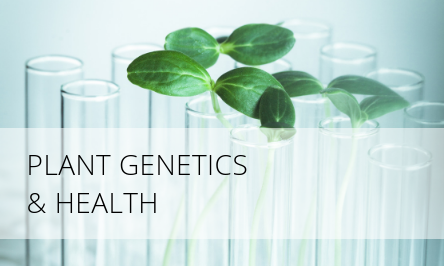

[vc_row][vc_column width="1/1"][vc_column_text]Out of approximately 50,000 plants presumed to promote human health, many have yet to be fully investigated and, as the pace of species extinction increases, opportunities to do so are gradually decreasing1. A recent study showed that more than 600 plant species have become extinct in the past 250 years – this is 500 times faster than expected based on historical records2. Poor land use resulting in monocultures, loss of natural pollinators and climate change have fuelled this decline, while many botanicals are being wildcrafted (harvested from the wild) – adding further to the risk of species decline in a changing climate. The extinction of these organisms holds many consequences for its natural ecosystem, as well as reducing the chances of discovering new natural compounds and extracts that may have a beneficial effect on human health.
Medicinal plants have been used traditionally for the prevention and treatment of diseases for many years3. Some of the earliest evidence of plant use for treating ailments date back to 2,600 B.C. in Mesopotamia, with about 1000 natural compounds being reported for their unique therapeutic effects4.

Artemisia annua L.
A more recent example is the discovery of artemisin, a naturally-derived compound from sweet wormwood (Artemisia annua L.) for the treatment of drug-resistant malaria parasites. During the war of North Vietnam with the US, China conducted extended research on novel antimalarial drugs to help the Northern Vietnamese treat malaria in the battlefield. More than 2000 herbal preparations were screened for their potential antimalarial effects5. Among these preparations were several extracts of Artemisia annua, which showed potential to inhibit these drug-resistant parasites. However, it was only when the chemist Tu Youyou studied a 1,600-year-old Chinese medical text that the optimal extraction methods for separating the active compound of this herb were rediscovered6. In 2015, she was awarded with the Nobel Prize in Physiology or Medicine for this discovery. While many cultures already use traditional medicine and medicinal plants to treat diseases, recent advances in genetics can provide a better insight of the specific bioactive metabolites, their concentration and the way they work to promote human health, as well as devise new strategies to protect endangered plant species.
The analysis of plant genes can provide useful insights into the phylogeny of the biological species, helping to identify plants of the same genus or family. Indeed, plants of the same family usually present several identical natural compounds or their derivatives, which may be easier to extract and separate1. Gene analysis may also prevent the overexploitation of plant species by isolating the specific genes responsible for the production of the active compounds and artificially culturing them in the laboratory.

Taxus brevifolia (source)
Consider the case of the anti-cancer drug Taxol, isolated from the bark of the Pacific Yew Tree (Taxus brevifolia). Initially, this tree was the only source of the drug, the extraction of the active substance was long and its yield was low. In addition, many trees that were hundreds of years old were needed to obtain this valuable compound7. With the advent of modern genetics, the use of stable plant cell lines, capable of producing the drug at significantly higher concentrations and quantities, has mitigated the risk of losing this crucial species.
Furthermore, species that occur in multiple geographic areas can be particularly interesting for identifying novel natural compounds, as adaption to their local environments can result in divergence in their genetic and chemical composition. This is the case for Sage (Salvia officinalis L.); a well-studied aromatic plant with a widespread distribution. In the Mediterranean, for example, geographically distinct populations produce different essential oils, and this variation is strongly associated with their genetic diversity8.
To sum up, plant genetics can be a valuable tool for the identification of high-quality botanical sources, natural extracts and compounds that may have a beneficial effect on human health. They can also provide information on the lineages to preserve and conserve the existing biodiversity and ecosystems.
At Sibelius, we use our patented Chronoscreen™ platform and our in-depth knowledge of plant biology to identify unique natural sources and form sustainable relationships with native plants; making clinically studied, scientifically proven and traceable natural ingredients accessible to everyone.
By Cristiane Forgiarini
Data Analyst
[/vc_column_text][vc_column_text]_____________________________________
1 Atanasov AG, et al. (2015). Discovery and resupply of pharmacologically active plant-derived natural products: A review. Biotechnology Advances, 33(8):1582-614.
2 Humphreys, AM et al. (2019) Global dataset shows geography and life form predict modern plant extinction and rediscovery. Nature Ecology & Evolution, 3:1043-1047.
3 Sofowora, A, et al. (2013) The Role of Medicinal Plants in the Strategies for Disease Prevention. African Journal of Traditional, Complementary and Alternative Medicines, 10(5): 210-229.
4 Cragg GM and Newman DJ. (2013). Natural products: a continuing source of novel drug leads. Biochimica et Biophysica Acta (BBA), 1830(6):3670-95.
5 Miller LH and Su X. (2011). Artemisinin: discovery from the Chinese herbal garden. Cell, 146(6):855-8.
6 Su X and Miller LH (2015). The discovery of artemisin and Nobel Prize in Physiology or Medicine. Science China Life Sciences, 58(11): 1175-1179.
7 Żwawiak J and Zaprutko L. (2014). A brief history of taxol. Journal of Medical Science, 83(1):47-52.
8 Rešetnik I, et al. (2016). Genetic diversity and demographic history of wild and cultivated/naturalised plant populations: evidence from Dalmatian Sage (Salvia officinalis L., Lamiaceae). PloS One, 11(7):e0159545.[/vc_column_text][/vc_column][/vc_row]